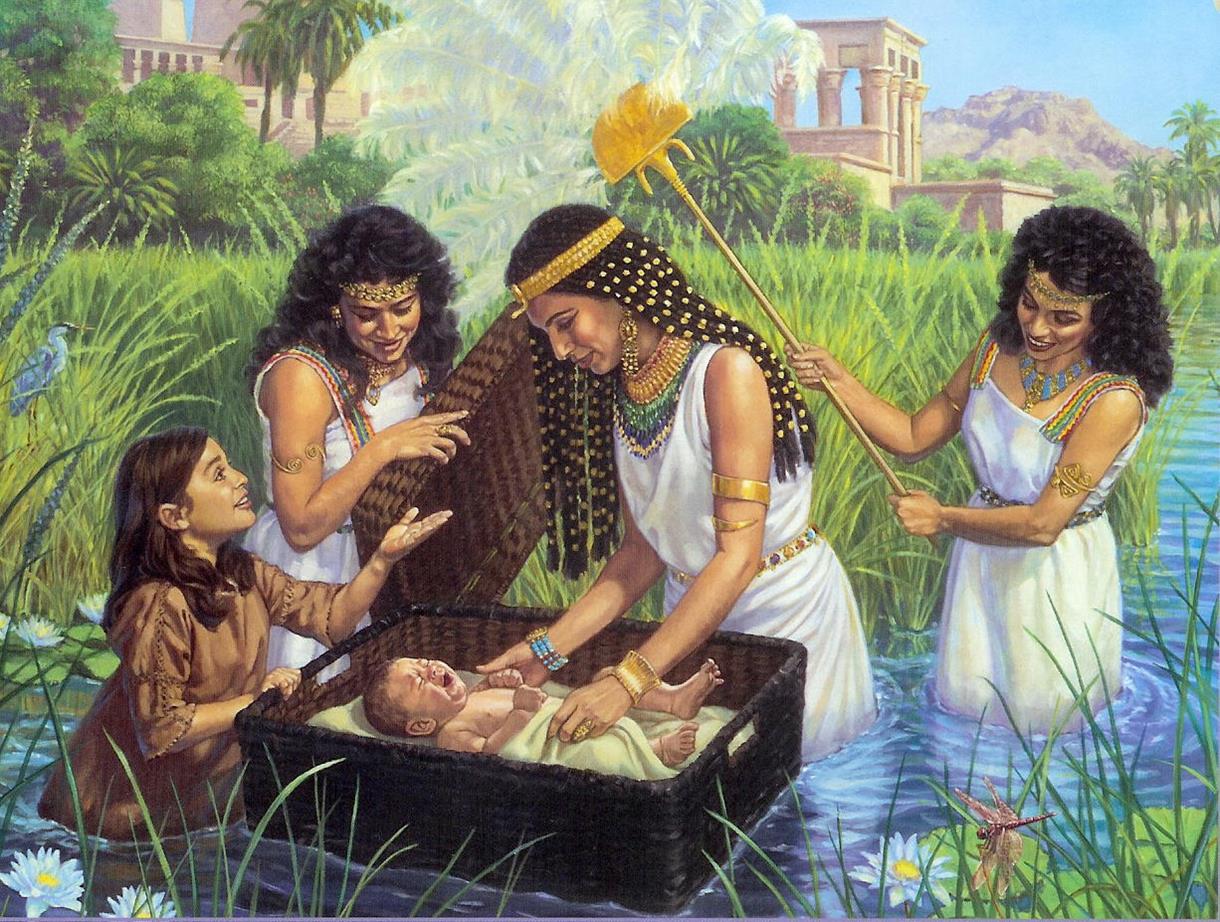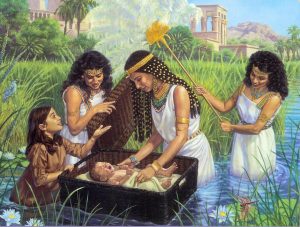Nu, given today’s stormy weather, many of you are home and mistama wasting time watching TV or surfing the Internet. Let’s review a few parsha highlights instead. Ober, first a few shout-outs; here we go!
________________________________________________________________________________
A big hearty mazel tov to Eitan Ross whom we know mamish since birth and whom we have had the pleasure of observing (mostly in our backyard) grow up and develop into the fine man he is today, upon his engagement to Danna Gal-Ed. Mazel tov to our friends Debbie and Shlomie Ross and to the entire extended Ross family. As well, mazel tov to Danna’s parents, Matty and Tsipora Gal-Ed.
And in the parsha where baby Moishe is born, welcome to the world baby Platschek, born to his very excited first time parents, Mari and Avrohom Chaim Platschek. Mari is the daughter of Nochi and Altchie Pelcovitz, long time friends of the Oisvofer. May baby Platschek be a source of nachas to his parents, grandparents and great grandparents for at least 120 years. A special mazel tov to great grandparents Rabbi and Rebbitzen Raphael Pelcovitz and their extended families. Mazel tov to the extended Levovitz and Platschek families. As well, a special mazel tov to great grand bubby Laura Levovitz and her entire family.
Raboyseyee and Ladies:
Speaking of Yichus (Pedigree)…
As we begin Sefer Shemois, we say one final goodbye to Yoisef our hero and overall good guy, his brothers and that entire generation. So begins Parshas Shemois wherein we will meet new heroes and villains, a new snake -maybe two- and as the RBSO makes good on a promise He made way back when to Avrohom Ovenu. If you remember at least one thing from your many days and years in Yeshiva while avoiding the rebbe’s advances with his shtekin, if you chap, efsher you recall that way back in parshas Lech Lecho, the RBSO told Avrohom Ovenu that his children would be strangers in a land that does not belong to them. What He really meant was that the Yiddin would be slaves in Mitzrayim (Egypt) to king Paroy who seemingly forgot what the Jews did for him and his economy. Sadly, Paroy the minuvil wasn’t the last ruler to mistreat the Yiddin; seemingly our past is littered with such villains. Nu, what can we do? Exactly what the Yiddin did wrong to deserve a 210 year slavery sentence is not told to us anywhere in the text ober as the Oisvorfer has told you on many an occasion: it’s none of your business! Shoin! The RBSO had a master plan and seemingly this chapter of our glorious history is retold beginning this week and for the next two shabossim culminating with their redemption and freedom which many Yiddin celebrate in hotels all over the world and by paying exorbitant prices for anything marked kosher for Passover. Isn’t being overcharged an excellent way of remembering how our ancestors were nebech forced into back breaking labor for 210 years? Don’t answer that. The stage is set. Lommer lernnin a bissel (some) parsha.
During their ordeal, Paroy forced the Yiddin into intense back breaking labor in order to crush their spirit and curtail their growth. The Yiddin became his slaves and were forced to build two large cities, by hand mamish. Paroy was a genius and understood that Yiddin don’t enjoy manual labor. Of course, the enslaved Yiddin were mistama on minimum wage and took revenge on Paroy: it took them a full 116 years to build these cities. Avada you know that for most Yiddin, manual back- breaking labor is strictly verboten. Lesson learned: ever since, parents have encouraged their kinderlach to attend college. Some say that the Yiddin could have completed the job much earlier but didn’t because of frequent breaks for minyan, long winded rabbis’ sermons, shul meetings, dinners, car pooling, fund raisers for other kings, concerts, Melava Malkas, weekend bar mitzvahs and parlor meetings for visiting out of town Rebbes and other schnorrers who came over from Russia, Israel and other countries. And nebech they fell behind because they refused to work on chol hamoied, erev Yom Tov, Isru Chag and, also went home early on Fridays.
This week, we say hello to Moishe, born to elderly parents, placed into a basket and into the river by his mother, rescued and ironically raised by Princess Bisya, Paroy’s own shiksa daughter. Moishe will be with us for the next 120 years; his name gets mentioned henceforth in the heylige Toirah in every single parsha but one. Avada we’ll cover that topic ober nuch nisht (not yet). And since we mentioned Moishe, let’s taka see where he came from, who his family was, whom he married, and his entire yichus (pedigree) and resumé that led to his becoming the RBSO’s favorite of all Toirah personalities. It’s all here in this week’s givaldige parsha of Shemois which covers the first 80 years of Moishe’s life in not too many sentences.
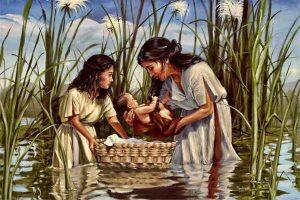 Lommer unfangin (let’s begin) with the mishpocho (family): Though Yaakov arrived to Mitzrayim with a total head count of either 66 or 70, seemingly the Yiddin, especially the women, were extremely fertile and as the parsha begins, they have grown exponentially since the last census into a headcount of three million. Exactly how so many children were born in such a short time period is avada discussed by Rashi, the Medrish and others and zicher the Oisvorfer will explain. Some say they were giving birth to six at a time, some say as many as sixty from one pregnancy, ver veyst. Another medrish tells us that every single Jewish woman had children and that they were all healthy; sounds good to the Oisvorfer. Halt zicheyn (keep your pants on). In any event, Paroy, afraid that the Yiddin would overrun his empire, had ordered two Jewish midwives, Shifrah and Pu’ah, to kill all the male babies (by partial birth abortions). A Republican he was not! The midwives, at risk to their own lives, ignored Paroy’s decree; no great surprise here; Jewish women don’t listen to anyone, even the king! Rashi tells us that these two midwives were none other than Yoicheved and Miriam, Moishe’s mother and sister to be. One medrish tells us that this dynamic duo weren’t Jewish at all; rather, they were Egyptians who were mistama pro life, ober for now, let’s make believe they were, avada it’s a better read.
Lommer unfangin (let’s begin) with the mishpocho (family): Though Yaakov arrived to Mitzrayim with a total head count of either 66 or 70, seemingly the Yiddin, especially the women, were extremely fertile and as the parsha begins, they have grown exponentially since the last census into a headcount of three million. Exactly how so many children were born in such a short time period is avada discussed by Rashi, the Medrish and others and zicher the Oisvorfer will explain. Some say they were giving birth to six at a time, some say as many as sixty from one pregnancy, ver veyst. Another medrish tells us that every single Jewish woman had children and that they were all healthy; sounds good to the Oisvorfer. Halt zicheyn (keep your pants on). In any event, Paroy, afraid that the Yiddin would overrun his empire, had ordered two Jewish midwives, Shifrah and Pu’ah, to kill all the male babies (by partial birth abortions). A Republican he was not! The midwives, at risk to their own lives, ignored Paroy’s decree; no great surprise here; Jewish women don’t listen to anyone, even the king! Rashi tells us that these two midwives were none other than Yoicheved and Miriam, Moishe’s mother and sister to be. One medrish tells us that this dynamic duo weren’t Jewish at all; rather, they were Egyptians who were mistama pro life, ober for now, let’s make believe they were, avada it’s a better read.
Next we learn that this same Yoicheved became pregnant and gave birth. Moishe was secretly born to his father Amram, and his mother Yoicheved. And who was Amram? Amram at 105 years old was the leader of the Jewish community in Goishen in the year 2,361 and was, according to the heylige Gemora (Buba Basra 121), one of the only people alive who saw and remembered Yaakov Oveenu. Moreover he was seemingly attracted to older women and we learn that his eishes chayil, Yoicheved, was a ripe 130. She was how old when she had baby Moishe? Suddenly, Soro who was but 90 when she had Yitzchok, appears to have been a spring chicken. And how is it that she became trugidik (pregnant) at her age? Let’s recall what a big deal the Toirah made over Soro becoming pregnant and delivering at 90 and many taka ask why Yoicheved’s age isn’t mentioned in the heylige Toirah. Isn’t pregnancy at 130 considered one of the greatest miracles of all time? Ober as you well know, the RBSO was plotting and scheming Moishe’s birth, why ask questions. Taka a kasha (good question) but not one without a teretz (answer): Says the heylige Gemora (Soita 12a) that she became young again. She did? Nu, long before the development of anti-aging creams, ointments, treatments, face-lifts, Botox, Laser treatments and other zachin (methodologies) that are now common place, the RBSO performed His own magic. Her wrinkles smoothed out, her skin became soft, her menstrual cycle returned, maybe even her mood swings, and she gave birth not just to Moishe but also to his siblings Aharon and Miriam. Was she taka 130? Ibn Ezra says no ober the Ramban and others say it’s emes. Was she or wasn’t she, ver veyst? Whatever her age, thankfully no one argues that she gave birth to Moishe. The Gemora discusses this and one day when you oisvorfs are ready, you’ll pick up the Gemora and learn this for yourselves (you’ll also save me a few hours of hard work). Ober for now and given your level of attention, stick with the Oisvorfer, efsher you’ll learn a shtikel something. Veyter.
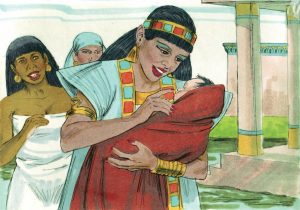 Shoin! A baby is born, mazel tov! Unfortunately, a few weeks later, he finds himself floating down the river. We meet Paroy’s daughter Basya, some call her Bisya, who went to bathe in the river, saw the basket, reached out to grab it, and the rest is history. And who is Basya besides being Paroy’s daughter, an Egyptian Princess and Moishe’s adoptive mother? Listen to this amazing medrish and amazing piece of Kabolah and you’ll quickly understand why it’s not recommended that people under 40 study it. Why? Because it will, like the rebbe tried, blow you away, if you chap. Citing the Zoihar Hakoidesh, the midrash tells us azoy: halt kup here (pay attention) because what you’re about to read is not explicitly stated in the heylige Toirah, ober the medrish avada has literary license and tells us this givaldige chiddish (breakthrough). Basya, Paroy’s daughter and Tzipporah, Moishe’s wife, whom we’ll meet soon enough , have something else in common besides a relationship with this Moishe. Tzipporah and Basya were twin sisters, sold in the market place shortly after birth and separated when two different men, Yisroy and Paroy respectively, purchased them. They have somewhat similar upbringings: Both are raised in homes of royalty (one in an Egyptian palace and the other in the home of the High Priest); both are steeped in homes and lands of Avoida zoroh (idolatry). Each, in their own way, will play significant roles in shaping and molding the man named Moishe who will lead a slave nation to freedom; to nationhood as the RBSO’s chosen people; and ultimately to the establishment of a holy kingdom settled by a holy nation of kings and priests. Their shiksa pagan backgrounds, devoid of any “yichus” of an Avrohom, Yitzchok or Yaakov, will actually serve them in their later roles in life. Having “been there, and done that”, their strength of conviction and commitment to the RBSO’s laws and the Yiddin will defy any human power on earth and outshine their peers spiritually privileged to have been born into the covenant. Well, blow me down. In other words: according to the zoihar, and who knew or imagined better, these two sisters, seemingly sold in the market as slave girls, wound up shaping our illustrious history. Bisya, aka: Paroy’s daughter, but definitely a shiksa, rescues Moishe from the river and he will ultimately lead the revolt against Paroy while Tzipoirah, her sister, is raised by Yisroy (soon to be Moishe’s shever (father in-law) and she ends up being married to Moishe. And so much for Yichus.
Shoin! A baby is born, mazel tov! Unfortunately, a few weeks later, he finds himself floating down the river. We meet Paroy’s daughter Basya, some call her Bisya, who went to bathe in the river, saw the basket, reached out to grab it, and the rest is history. And who is Basya besides being Paroy’s daughter, an Egyptian Princess and Moishe’s adoptive mother? Listen to this amazing medrish and amazing piece of Kabolah and you’ll quickly understand why it’s not recommended that people under 40 study it. Why? Because it will, like the rebbe tried, blow you away, if you chap. Citing the Zoihar Hakoidesh, the midrash tells us azoy: halt kup here (pay attention) because what you’re about to read is not explicitly stated in the heylige Toirah, ober the medrish avada has literary license and tells us this givaldige chiddish (breakthrough). Basya, Paroy’s daughter and Tzipporah, Moishe’s wife, whom we’ll meet soon enough , have something else in common besides a relationship with this Moishe. Tzipporah and Basya were twin sisters, sold in the market place shortly after birth and separated when two different men, Yisroy and Paroy respectively, purchased them. They have somewhat similar upbringings: Both are raised in homes of royalty (one in an Egyptian palace and the other in the home of the High Priest); both are steeped in homes and lands of Avoida zoroh (idolatry). Each, in their own way, will play significant roles in shaping and molding the man named Moishe who will lead a slave nation to freedom; to nationhood as the RBSO’s chosen people; and ultimately to the establishment of a holy kingdom settled by a holy nation of kings and priests. Their shiksa pagan backgrounds, devoid of any “yichus” of an Avrohom, Yitzchok or Yaakov, will actually serve them in their later roles in life. Having “been there, and done that”, their strength of conviction and commitment to the RBSO’s laws and the Yiddin will defy any human power on earth and outshine their peers spiritually privileged to have been born into the covenant. Well, blow me down. In other words: according to the zoihar, and who knew or imagined better, these two sisters, seemingly sold in the market as slave girls, wound up shaping our illustrious history. Bisya, aka: Paroy’s daughter, but definitely a shiksa, rescues Moishe from the river and he will ultimately lead the revolt against Paroy while Tzipoirah, her sister, is raised by Yisroy (soon to be Moishe’s shever (father in-law) and she ends up being married to Moishe. And so much for Yichus.
And in more other words: according to the heylige Zoihar: both Moishe’s wife and adoptive mother were not Jewish. And did any of these blemishes prevent Moishe from becoming the RBSO’s favorite of all Toirah personalities? Avada nisht (certainly not)! In fact, punkt farkert (quite the opposite appears to be true). Seemingly, it was efsher because of his background, or lack of it, that he was selected. It’s efsher hard to chap (grasp) this but were Moishe to be around and on the shidduch (eligible single) market today, would he be able to find a suitable shidduch or would his shidduch resumé immediately be discarded by the shadchonim (matchmakers) who are typically concerned with more important issues like tablecloths, house robes, plastic dishes, and other such germane questions, all of course critical to a marriage, not! And the big question of the week is this: would Altchie Pelcovitz (shouted-out above for the birth of a grandson this week) have taken him on as a client? Seemingly, the heylige Zoihar wasn’t concerned about Moishe’s background and neither was the RBSO. And as the Oisvorfer has told you on more than one occasion: don’t mess with the Zoihar or the Zohan.
Back to the still nameless and crying baby floating down the Nile. Basya sent for a wet nurse to feed the baby, but the baby refused to nurse from an Egyptian shiksa; what was he thinking? She named him Moishe and efsher you’re wondering why his parents didn’t name him and if they did, why we aren’t told his name; me too! Back to Basya: She tried to nurse him but Moishe wasn’t sucking. Avada you’re wondering why a hungry and thirsty baby wouldn’t want to be nursed by a hot young shiksa princess, or any shiksa for that matter. Me too! Efsher the tayvo (strong desire) for sucking on the bosom of a shiksa princess only kicks in later in life, if you chap, ver veyst?
Says the Ramo (Yoreh Deah Siman 81 Sif 7): a child should not nurse from an Egyptian woman (or any other Akum (shiksa) since it brings to Timtum HaLev (stuffing up of the Jewish heart) and Teva Ra (bad tendencies), as you well know, rachmono litzlon (heaven forbid). And what’s his source for such a devastating halocha? Answer: the origin is in this week’s parsha where Moishe turned down Basya’s bosom. And just because you’re not Moishe Rabaynu, that doesn’t mean that you have a free pass for your chazerish (slime bucket) behavior, if you chap. Some state that if you are going to be with a hot shiksa, that’s ok but you zicher should stay away from her bosom.
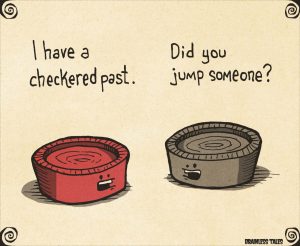 Nu, while on the topic of yichus, let’s taka see who Moishe was able to marry given his illustrious mishpocho dynamics. Let’s first meet his father in- law Yisroy. Sadly we cannot meet his shvigger (mother in-law) since there is absolutely no mention of her whatsoever. Though his shver Yisroy (Jethro ba-di-goyim) was a former Midianite high priest of avoida zoro (idolatrous worship), he was rewarded by getting a parsha named after himself and that’s not too shabby when you consider that there are but 54 parshas in the gantze heylige Toirah. And says the Medrish (Shemos Rabbah),azoy:.“[At first] Yisroy was a priest to idols. [Then], even before Moishe made his way to Midian, but after fleeing for his life when his step-grandfather Paroy wanted to kill him, Yisroy, on his own, came to the realization that idol worship was taka nothing but idol. He renounced that lifestyle and considered becoming a baal tshuva. (actually this all predates the Yiddin becoming Yiddin – so exactly what he thought he was converting into, ver veyst). He called the people of his town and said to them, ’Heretofore, I have served you, but now I am old. Choose for yourselves a different priest.’ And he brought out the vessels used in the service of idols and gave them to [the townspeople]. They then excommunicated him so that no one would associate or work with him. According to the Medrish,Yisroy was a remarkable goy (pagan, to be more precise), who, in his quest for the ultimate truth, searched for meaning in all of the various idolatrous practices before ultimately converting to join Moishe and the Yiddin on their quest. Gishmak! And as the Oisvorfer has told you in the past, it appears that the RBSO loves people with a past; could there be better news for most of you giferliche bums? Seemingly people with a past can better rise above the fray and become Toirah heroes and overall good guys. In other words: he made his own Yichus, you can too.
Nu, while on the topic of yichus, let’s taka see who Moishe was able to marry given his illustrious mishpocho dynamics. Let’s first meet his father in- law Yisroy. Sadly we cannot meet his shvigger (mother in-law) since there is absolutely no mention of her whatsoever. Though his shver Yisroy (Jethro ba-di-goyim) was a former Midianite high priest of avoida zoro (idolatrous worship), he was rewarded by getting a parsha named after himself and that’s not too shabby when you consider that there are but 54 parshas in the gantze heylige Toirah. And says the Medrish (Shemos Rabbah),azoy:.“[At first] Yisroy was a priest to idols. [Then], even before Moishe made his way to Midian, but after fleeing for his life when his step-grandfather Paroy wanted to kill him, Yisroy, on his own, came to the realization that idol worship was taka nothing but idol. He renounced that lifestyle and considered becoming a baal tshuva. (actually this all predates the Yiddin becoming Yiddin – so exactly what he thought he was converting into, ver veyst). He called the people of his town and said to them, ’Heretofore, I have served you, but now I am old. Choose for yourselves a different priest.’ And he brought out the vessels used in the service of idols and gave them to [the townspeople]. They then excommunicated him so that no one would associate or work with him. According to the Medrish,Yisroy was a remarkable goy (pagan, to be more precise), who, in his quest for the ultimate truth, searched for meaning in all of the various idolatrous practices before ultimately converting to join Moishe and the Yiddin on their quest. Gishmak! And as the Oisvorfer has told you in the past, it appears that the RBSO loves people with a past; could there be better news for most of you giferliche bums? Seemingly people with a past can better rise above the fray and become Toirah heroes and overall good guys. In other words: he made his own Yichus, you can too.
Not just was Yisroy, the reformed avoido zoronik (former idol worshipper) zoiche (merited) to have a parsha with his name but listen to this amazing tidbit of givaldige information you can mamish say over at the shabbis tish, but not yet. You’ll have to wait five more shabossim. The first person to utter the two all purposeful, all meaning and all-encompassing words of Boruch Hashem (blessed be the Lord), in that precise form, were not spoken by our heylige Ovis (patriarchs) Avrohom, Yitzchok , Yaakov or even Moishe…but Yisroy. Is this gishmak mamish or what? Veyter.
Moishe grows up in the king’s palace, killed a Mitzri, was ratted on by another Jew, and hightailed out of Mitzrayim. He ended up in Midian in the southeastern region of the Sinai Peninsula where he came across a well. What was Moishe (not yet Rabaynu at this time) doing at the well in Midian in the first place? Nu, says Rashi quoting the Medrish (Shemois Rabbah 1:32) that Moishe sat at the well with the hope of meeting a nice girl. What made him think that he’d find a nice girl at the well? Was this the ‘in shidduch meeting place’ at that time? Efsher we can kler (posit) that Moishe, a former Egyptian prince, must have had private tutoring and mistama also studied some Jewish history because avada he recalled that a well was a good place for nice single and eligible bachelor to meet a nice girl and shoin: that is exactly what happened. Mistama he recalled that Yaakov Oveenu met his love, Rochel at a well and that Eliezer, Avrohom’s servant, who had to chap his masters yerech (penis) in order to swear that he’d bring home the right girl, also first encountered Rivka at a well. Nu, as they say, all’s well that ends well.There at the well; he encountered not one but seven girls, all daughters of this Yisroy fellow, who were being persecuted by the local shepherds. Says the Medrish: the girls were being persecuted because their father Yisroy was now a defrocked and excommunicated priest and the local townspeople weren’t too happy with him or his mishpocho. Whereas Yisroy was formerly the leader of Midian, he was now considered a traitor. Moishe, our hero, protected the girls from harm’s way, seemingly fell in love with Tzipoira, one of Yisroy’s daughters. Why Tzipoirah? Ver veyst but according to at least some medroshim, he was struck with her beauty and some say, not just was she beautiful but also black and what could be better? Shoin: Moishe married her, had two quite unremarkable kinderlach whose names are mentioned only in this parsha and nowhere else in the heylige Toirah, and they lived happily ever after, at least for a short while. Let’s remember these two kinderlach because what happened next involved these two boys. The year was approximately 2428, and Moshe was 60. Veyter.
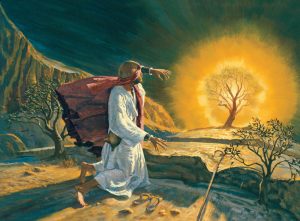 Is that what happened? Not according to the Targum Yoinoson ben Uzeil who says azoy: when Yisroy found out that Moishe was a fugitive from Mitzrayim, he threw Moishe into a pit where Moishe languished for 10 years. During that time, one of his daughters (hopefully Tzipoirah) took care of Moishe’s needs and eventually became his eishes chayil. Gishmak mamish! What those needs are, he does not tell us, but we imagine that food was also included. Whatever happened we taka don’t know but seemingly Moishe was happy with his new wife and life. Moishe, like other famous Toirah personalities became a shepherd and while tending Yisroy’s sheep at Choirev, Moishe encountered a bush that was afire but was not consumed by it. It’s avada not every day that one encounters a burning bush, if you chap and especially one that talks ober that’s exactly what took place.
Is that what happened? Not according to the Targum Yoinoson ben Uzeil who says azoy: when Yisroy found out that Moishe was a fugitive from Mitzrayim, he threw Moishe into a pit where Moishe languished for 10 years. During that time, one of his daughters (hopefully Tzipoirah) took care of Moishe’s needs and eventually became his eishes chayil. Gishmak mamish! What those needs are, he does not tell us, but we imagine that food was also included. Whatever happened we taka don’t know but seemingly Moishe was happy with his new wife and life. Moishe, like other famous Toirah personalities became a shepherd and while tending Yisroy’s sheep at Choirev, Moishe encountered a bush that was afire but was not consumed by it. It’s avada not every day that one encounters a burning bush, if you chap and especially one that talks ober that’s exactly what took place.
In a scene reminiscent of mission impossible, lehavdil, Moishe is appointed messenger to bring the Yiddin out of Egypt into the Promised Land. Moishe responded that he was unworthy of such an awesome task, but was assured of Divine assistance. Says the medrish: the entire conversation lasted seven days. Once he accepted the mission, Moishe asked Yisroy for permission to leave Midian and if time permits, efsher we’ll discuss why permission may have been needed. Along the way, the RBSO seemingly had a change of heart and this is what went down.
Rashi, who else, mentions the heylige Gemora (Nedarim 31B) which tells us that along the way, two angels in the form of snakes engulfed every part of Moishe’s body except his makoim milah (penis). In other words: he was swallowed up, efsher a first for a Jewish husband, if you chap. His eishes chayil (wife) Tzipoirah realized that the crisis was being caused by their son Eliezer’s lack of a bris milah. How she made this connection, ver veyst, but when she noticed that all that was left of her husband was his Mila, she deduced that epes wasn’t right. What to do? She, in the first ever Jewish bris performed by a woman, chapped a sharp stone and circumcised her son. Immediately thereafter, the snakes released Moishe unharmed. Is there any reason to read a farkakte novel when you can learn Toirah? Not!!!
Nu, avada you’re klerring (pondering) azoy: if Tzipoirah did such good work, why don’t we see more Brissim performed by women? And wouldn’t you know, this very topic is discussed in the heylige Gemora (Avoidah Zoro 37A) where we find a machloikes between Rav and R’ Yoichonon about this very topic. The Gemora tries to use the Tzipoirah incident as proof for R’ Yoichonon’s view that women are indeed able to circumcise, but Rav isn’t biting, if you chap. Says Rav: that Tzipoirah did not perform the bris on her own son. He posits that she either told someone else (presumably another Jew) to circumcise Eliezer or that she only did part of the milah, with Moishe finishing the job. Grada this theory makes perfect sense as we can all agree that mistama Tzipoirah, as a nice Jewish woman wasn’t going to perform metzitza be’peh on anyone, let alone on her own son. Ober says, Reb’ Yoichonon that all women are able to perform a milah, just as Tzipoirah did. Shoin!
 Supporting Reb Yoichonon’s view that women may in fact perform a bris are no lesser giants than the Rif, Rosh, RambaM, and the Shulchan Aruch. The Rif in particular writes, at the very end of his commentary on Perek R’ Eliezer D’Milah, that we pasken like Reb Yoichonon.
Supporting Reb Yoichonon’s view that women may in fact perform a bris are no lesser giants than the Rif, Rosh, RambaM, and the Shulchan Aruch. The Rif in particular writes, at the very end of his commentary on Perek R’ Eliezer D’Milah, that we pasken like Reb Yoichonon.
Efsher you’re wondering and takeh some ask, why Moishe didn’t perform the bris, why Tzipoirah? Nu, how would the Vaad react if a female Moiel showed up to Shul to do a bris and the metzitza? OMG! Nu- according to the p’shat that he (Moishe) was swallowed up by the malach/snake, I reckon it would be hard to move about while inside the snake. Moreover, why is the snake making trouble again, didn’t he cause enough tzurus (issues) back in Breishis? Didn’t he learn his lesson when the RBSO cut his legs off for making moves on Chava with the forbidden fruit? And with that background, let’s learn the pisukim.
| 24. Now he was on the way, in an inn, that the Lord met him and sought to put him to death. | כד. וַיְהִי בַדֶּרֶךְ בַּמָּלוֹן וַיִּפְגְּשֵׁהוּ יְ־הֹוָ־ה וַיְבַקֵּשׁ הֲמִיתוֹ: | |
| 25. So Tzipporah took a sharp stone and severed her son’s foreskin and cast it to his feet, and she said, “For you are a bridegroom of blood to me.” | כה. וַתִּקַּח צִפֹּרָה צֹר וַתִּכְרֹת אֶת עָרְלַת בְּנָהּ וַתַּגַּע לְרַגְלָיו וַתֹּאמֶר כִּי חֲתַן דָּמִים אַתָּה לִי: | |
| 26. So He released him. Then she said, “A bridegroom of blood concerning the circumcision.” | כו. וַיִּרֶף מִמֶּנּוּ אָז אָמְרָה חֲתַן דָּמִים לַמּוּלֹת: |
Nu, I can see that you’re lost; likely you never got this far into the parsha before being kicked out or otherwise roaming the hallways. Ober this givaldige and amazing story all unfolds in shishi (sixth aliya). All you remember from the parsha is that Moishe is born and the burning bush- and taka, who wouldn’t remember such an encounter? Nu, we can clearly see that there’s more to the heylige Toirah than this little incident (now even smaller). You must read the pisukim above and chap p’shat. The family is on the way to Mitzrayim for the big meeting with Paroy. Moishe is acting on the RBSO’s command to save the Yiddin and the RBSO wants to kill him!? Since when do we kill the messenger? What the hec is going on here? What’s p’shat? Forget about p’shat, what do the words mean? Didn’t the RBSO just finish convincing Moishe that he’s the man for the job, and now death? Are you confused? The miforshim can’t make sense of it either from the words or even from the Rashi but they do try and here’s a sampling of their thinking; select the p’shat that talks to you. 1- Moishe was negligent and deserved to die because he didn’t circumcise his son Eliezer, and the penalty was death. Is this p’shat?
Or, do we follow a Beraisa in which Reb Yosi said: rachmono litzlon (heaven forbid)! Moishe wasn’t negligent! Moishe thought: ….If I circumcise him and set out on a journey, the child’s life will be in danger for three days. On the other hand, efsher I should circumcise him and wait three days, ober [but,] the RBSO has commanded me, “Go! and return to Egypt.” Then, why was he punished? Because his first concern was his lodging – p’shat is that Moishe was wasting time arguing for an upgraded desert view room. (Nedarim). Nu, so what happened? The angel turned into a snake and swallowed him (Moishe) from his head to his thigh [and spit him out] and then again swallowed him from his feet to that place (his penis).
Or, Reb Shimon ben Gamliel says it was the baby whose death was sought. And some commentaries (notably Rabbenu Chananel in Yuma 85b) suggest that Tzipoirah was at fault due to her idolatrous upbringing (efsher maybe Moishe should not have married her at all); what would your father say if you brought home a Midianite very dark looking shiksa? According to this p’shat, it was the baby that the Malach swallowed feet first till his genital organ, then swallowed the child’s head first, also stopping at the organ. And the bottom line: the snake is seemingly always in some trouble, if you chap. One thing they all agree on: that none of them agree on what may have taken place. What else is new?
Another view. RambaN and Targum Yoinoson posit that the child Tzipoirah needed to circumcise was Gershom, Moishe’s older son. Huh?? Gershom? How old was he and why wasn’t he already circumcised? P’shat here is that Yisroy made Moishe and Tzipoirah promise that they would not circumcise him as long as they lived in Midyan and as long as they were living off the in-laws, and they complied.
What can we learn from all of this? Seemingly, the RBSO is quite serious about bris milah (circumcision) and serious enough to almost lose the central character of the entire book of Exodus. Where would we be without Moishe Rabaynu? And we also learn that when it comes to tzadikkim (truly righteous people), the RBSO is exacting to the hairsbreadth- he punishes them for their tiny misdeeds in this world so that they can enter the next world perfectly free of any taint. And that, Raboyseyee, is more givaldige news for most of you giferliche bums. Seemingly you have nothing to worry about as your list of chatoim (misdeeds) is so long and over so many years, that the RBSO will (likely) not deal with you in this world, though if you’re lucky, you may get swallowed up once in a while, if you chap.
A gitten Shabbis-
The Heylige Oisvorfer Ruv
Yitz Grossman
